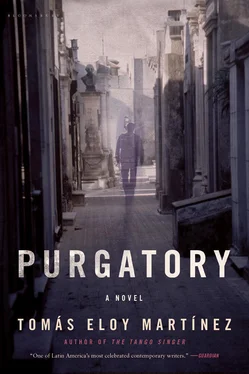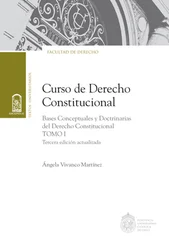‘Ethel, querida , I’m your husband,’ Dupuy told her. ‘What’s the matter?’
‘Surely you can see I am still in my nightdress, señor? Could you please leave? I’m a married woman.’
Her father called Emilia at the Automobile Club and ordered her to come back to the house immediately. He did not know what to do with his wife and it seemed to him that, before he called the doctor, it would be prudent to wait for the symptoms to manifest themselves more clearly.
‘Emilia is going to come and take care of you, Ethel,’ he told his wife, kissing her forehead. ‘I’ve got meetings all morning.’
‘Thank you, señor. I don’t need anyone to take care of me. As soon as you’ve gone, I’ll get up.’
When Emilia arrived, her mother was still in bed. She did not recognise her daughter either, but she easily accepted Emilia’s offer to bring her a glass of milk and some biscuits from the kitchen. Seeing her return with the tray, her mother reacted oddly, greeting her again as though she had just arrived.
‘Who am I, Mamá ?’ Emilia asked, giving her the answer.
‘You’re Rita my sister. Who else would you be?’
Rita had died ten years earlier. Emilia quickly realised that, for her mother, time had stopped in a happy eternity.
She was taken to the clinic opposite the house where they tested her reflexes and pointlessly asked her questions about her age, the city and the street where she lived. In the afternoon, she was still submerged in the same forgetful torpor. At times, Emilia thought she was almost her old self. At others, she was disheartened to hear her talk like a complete stranger, words that seemed to come from someone else’s throat. One of the nurses said something that made her think: I’ve known patients who wanted to drift away, people who are weary of themselves. Some of them recover by staying in that state of nothingness only to get sick again if they’re forced to come back. Emilia had read something similar in Proust: The most humiliating suffering is to feel that one no longer suffers .
The doctors asked how long she had been suffering these symptoms. No one knew; no one had been paying attention.
‘She’s been very distracted lately,’ the father said, ‘but then she was always that way.’
‘A few weeks ago, she got it into her head that there were men spying on her,’ Chela told them. ‘Since then, she’s been staying in her room with the curtains closed. She’ll walk into the kitchen or the bathroom and forget why she’s there.’
‘That’s strange,’ the father said, ‘I hadn’t noticed.’
‘And you don’t know that she drops her trousers in the middle of the kitchen and pees in front of the servants.’
‘You shouldn’t talk about such things, they’re private.’
‘Any little detail is helpful,’ the doctors said. ‘You’ll need to keep an eye on her for a while. When we have a clear diagnosis, we’ll know how best to help her.’
‘She’ll be better cared for here in the clinic than she will anywhere else. Make sure she has a nurse with her day and night,’ the father decided.
‘That would be a mistake,’ one of the doctors said. ‘She has a better chance of improving in her own home. Nothing can take the place of the care and affection of her loved ones.’
‘It’s not that simple,’ Dupuy countered. ‘I’m out at work all day. I have important responsibilities I cannot simply give up. How are we supposed to deal with her if she’s getting worse?’
‘She is a very tranquil person,’ said the same doctor. ‘The best thing is to be gentle and patient with her.’
‘Do you have any idea how long this might last?’ the father asked. ‘I need to be able to relax too.’
‘If it bothers you, put her in another room,’ the doctor said impatiently. ‘Keep her company when you have the time. And leave the television on. That might help her.’
They brought Señora Ethel home. Emilia made up a room with two beds far from her father’s bedroom and suggested she stay for a while to look after her. At dinner time, she turned on the television. There was a variety show on called La noche de Andrés . The host sang (very badly), danced, told inane stories, introduced other singers (who were even worse) and promised each new act would reveal the secret of happiness. Every fifteen or twenty seconds there was a roar of applause, a burst of canned laughter. Emilia noticed that her mother was weeping, her face expressionless. Tears trickled down her face, soaking her nightgown.
‘Are you in pain?’ Emilia asked. ‘Do you want me to call the doctor?’
‘This programme is really sad,’ her mother replied. ‘Just look at what these people have to do to get attention.’
‘I don’t understand what you’re saying.’
‘Can’t you see they’re prisoners. They’re in jail and in order to get out they have to draw a car on the wall.’
‘What car?’
‘Any car. Can’t you see them? They draw it with chalk, open the car door and disappear.’
The Eel found out about Ethel’s illness that afternoon and on Sunday after Mass came to visit the Dupuy family.
‘Ethel will recognise me,’ he said to his wife with the swollen legs. They arrived at the mansion on the calle Arenales with a military escort. The priest’s sermon at Mass had proposed a riddle with no solution. It had something to do with the Gospel passage about salt losing its saltiness. The priest had glared down from the pulpit: Christ would know what to do with such salt. But what of us? Wherewith will we season it?
‘Why would anyone want to season something that doesn’t exist?’ he asked his wife.
‘What do I know?’ she replied. ‘It seems obvious to me — you just buy some more salt.’
She said the sermon had depressed her and she no longer had the energy to visit sick people. The president did not feel like it either, but duty had to come before everything. He did his best to seem touched when Dupuy came out to meet him. And yet he could not suppress the tics that had been annoying him for months now: sudden, violent electrical discharges flashing through his face. He was wearing a twill suit and the same heavily Brylcreemed hairstyle he wore when he gave speeches. Dupuy went with him to the bedroom.
‘Señor Presidente.’
To refresh the sick woman’s memory, one of the daughters announced his name as he went in while she stared into space with an expression of bliss.
‘Come on now, Ethel, who am I?’ asked the Eel, bringing his perfumed face close to hers.
‘Good day to you, señor. Thank you for coming.’
There was one of the silences which carried her off to another place, then she went on in the same tone, though her voice was different.
‘Come on then, out with it, you little coward. You went to Conti and told him everything. Get out, go on, fuck off.’
The president’s aide-de-camp had the military escort leave the room.
‘She’s got you confused with Tito, señor,’ Dupuy explained. ‘Her twin brother, he used to play with her. Don’t pay any attention. You’ll have to forgive her, she’s not herself.’
‘Tito puto , go get yourself fucked by some germs. I hope they germinate you good and fuck you till you’re fucked.’
The voice became more and more shrill as though sharpened with a sabre. Emilia rushed into the room and hugged her mother.
‘ Papá , leave her alone, please. All these people just confuse her. Poor Mamá , poor thing.’
Disappointed, the president shook his head, took Dr Dupuy’s arm and went out into the corridor.
‘I’m sorry, Dupuy. I had no idea she was so bad. Her expression is completely blank.’
Читать дальше












